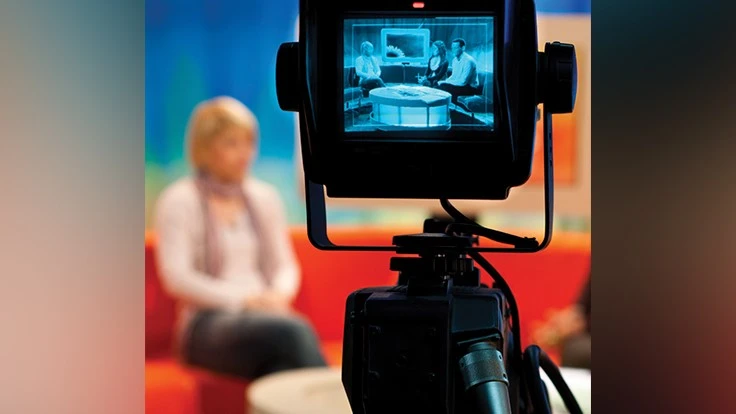

Being on television or even appearing in a YouTube video can be intimidating. The thought of hundreds, thousands or even millions (should your video go viral) of people watching you cancause some to struggle to be themselves when the lights and cameras go on. But appearing in television segments can help attract more people to buy plants, therefore supporting the entire green industry supply chain. Consider tag-teaming television appearances with your independent garden center or landscape contractor customers.
How can someone with no previous experience on camera prepare themselves to take the next step in promoting their knowledge? Or if you have experience, how can you take it to the next level? Ryan McEnaney, who regularly appears in local TV segments in the Twin Cities as Bailey’s public relations and communications specialist, shares his key tips you can use when preparing for an on-camera segment.
1. Know your audience
“Do you know who watches the show on which you’ll be appearing? Is it a Saturday morning news program or a regional lifestyle show? Knowing who’s digesting the information will help you determine what to talk about with the hosts,” McEnaney says.
McEnaney suggests a Saturday morning news show to showcase tactical tips and tricks segments such as when to prune, top five new plants for spring, choosing the right plants for a shaded area, among others.
An afternoon lifestyle show would be a great chance to showcase how-to projects like building a hydrangea wreath, cutting flowers from the garden for a beautiful arrangement or drying flowers for the fall/winter tablescape, McEnaney says.
2. Rely on customers and social media for topics
When considering what topics to use for your segment, it may be as simple as looking at what your customers are saying or sharing on social media. McEnaney says that when he comes up with topics for TV or video for the web, he reviews the company’s Facebook page and email inbox, as well as comments on social media posts.
“When you’re trying to come up with topics, don’t stress out over it,” McEnaney says. “Go with what people are already asking you. If you’re seeing a trend in customer questions in person or online, start there.
“If you’ve had five people asking on Facebook about how to prune a hydrangea, then it’s a relevant topic that’s worth pitching to a TV producer. When you’re pitching, be sure to tell them that it’s a question you get over and over in your business; that’ll help lock in your pitch and get it picked up.”
Taking these steps can make for great TV that helps connect with your audience. McEnaney says if you’re doing that, you’ll get asked to come back.
3. Be prepared and know your material
Once you land your segment, your preparation will be the key to your success.
“While you’ll work with the producers to outline the segment, the host(s) will ask you questions off the cuff,” McEnaney says. “Since you’ll likely be involved in topic selection for each segment, be sure you choose material that you’re comfortable with and that you can react to on your feet.”
By preparing accordingly and answering each question asked accurately, the TV segment showcases your expertise on the topic and, in turn, drives business to your company, he says.
4. Look your best
Just as you prepare your topic for your TV segment, you must also prepare your personal appearance. McEnaney says that women and men shouldn’t be afraid of a little powder on their face.
“The studio lights add shine, so be sure to put on a little powder beforehand so you look your very best,” McEnaney says. “Remember that you’re not only representing yourself, but your company, and this will make you look professional and put together.”
McEnaney suggests either a translucent powder (that you can get cheaply at almost any drugstore), or if you’re going to be a regular on TV, invest in mattifying primer.
5. Be yourself
When you walk into the studio, don’t forget who you are. McEnaney says to not get intimidated by local TV celebrities, cameras or the lights.
“You’re the expert, so be confident and excited to share whatever topic you’re discussing,” McEnaney says. “If you’re feeling nervous, ask a friend or colleague to have a high-level conversation about your topic the day before. Don’t make it an interview, but just a normal conversation. It’ll help you put together your talking points in concise sound bites.”
Another option is to write out your top three to five points, but not to memorize them.
“You want to be prepared, but not scripted,” McEnaney says. “Even though it’s on TV, these segments are really just conversations between yourself and the host or other guests.”

Explore the September 2019 Issue
Check out more from this issue and find your next story to read.
Latest from Greenhouse Management
- Anthura acquires Bromelia assets from Corn. Bak in Netherlands
- Top 10 stories for National Poinsettia Day
- Langendoen Mechanical hosts open house to showcase new greenhouse build
- Conor Foy joins EHR's national sales team
- Pantone announces its 2026 Color of the Year
- Syngenta granted federal registration for Trefinti nematicide/fungicide in ornamental market
- A legacy of influence
- HILA 2025 video highlights: John Gaydos of Proven Winners





